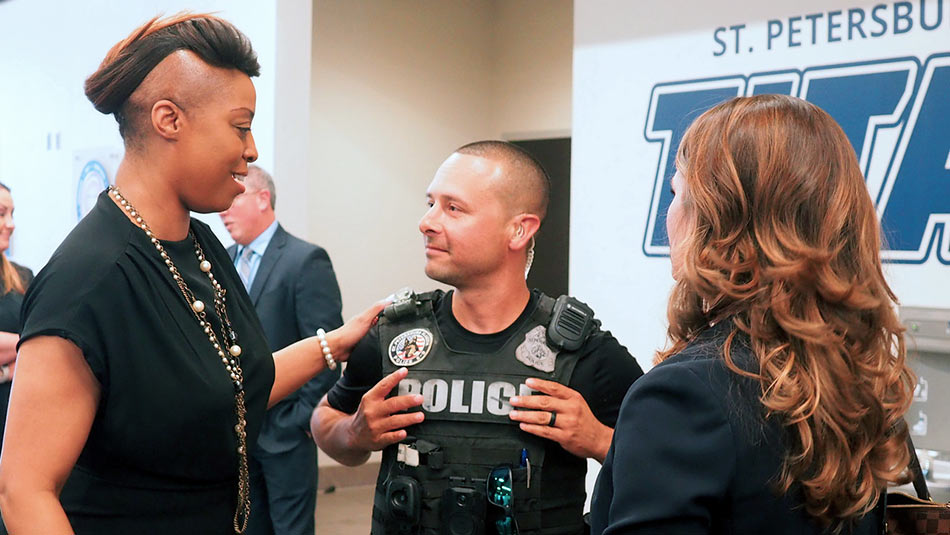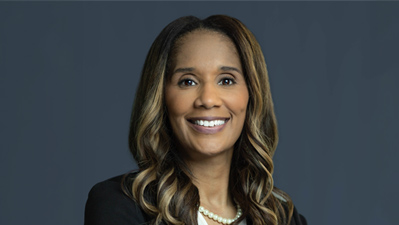Taking Care of our Heroes
Cathi Carr | 7/18/2023

Dr. Latresha Moore, Director of the Human Services Program at SPC; Jonathan Vazquez, President of the Sun Coast Police Benevolent Association and Sasha Lohn, General Counsel and Executive Director of the Sun Coast Police Benevolent Association
For Jonathan Vazquez, losing just one friend to suicide was too much. During his two Army tours in Iraq, he lost others to the same fate.
Now, as President of the Sun Coast Police Benevolent Association, Vazquez has worked closely with college, local and state leaders to develop the first-of-its-kind program in the Florida College System: SPC’s Applied Mental Health Advanced Technical Certificate built for first responders.
The certificate will offer critical skill sets to professionals, particularly law enforcement officers, who face mental health issues — both personally and among the citizens they serve.
“We see the worst of the worst, and are exposed to trauma every single day,” Vazquez said. “That accumulation can be overwhelming.”
For many first responders, including military members and veterans, law enforcement officers, firefighters, emergency medical technicians and public safety telecommunicators, the price they pay can be heavy for doing what they love, what many of them consider a calling, a duty. Statistics show they suffer increased risks for mental health issues such as depression, post-traumatic stress disorder (PTSD), stress, and suicidal behaviors and yet are reluctant to seek help. They are particularly cautious of those who don’t share their background.
To make sense of their experience and its affects, “they need to talk to someone they trust, someone who has seen what they’ve seen, smelled what they’ve smelled,” said Vazquez, a St. Petersburg Police Department K-9 Handler and Trainer who has tenaciously pursued making the certificate a reality. “Otherwise, it’s hard for them to open up.”
Unwavering support
To get the program started, the 2023 Florida Legislature provided SPC with $387,000. The new certificate is part of the College’s Bachelor of Science in Human Services Degree, also being offered for the first time this fall.
“With their help, we have stepped up to the plate to assist our overall and law enforcement communities,” said SPC Human Services Program Director Dr. Latresha Bighem-Moore. “The advocacy piece is crucial to raise awareness of these issues and to take better care of ourselves and our community.”
In building momentum for the program, Vazquez worked closely with Bighem-Moore, SPC’s Dean of the College of Social & Behavioral Sciences Dr. Joseph Smiley, and Pinellas County Commissioner Kathleen Peters, an SPC alumna who served in the Florida House of Representatives from 2012-18.
The inaugural class of 25 students began in August, 2023 with students from the St. Petersburg, Largo, Gulfport and Tarpon Springs police departments and Pinellas County Sheriff’s Office.
“Their experience allows them to better serve any veteran or first responder as they have walked in their shoes and have a better understanding of their trauma,” said Peters, who has advocated throughout her career for reforming the behavioral health system of care and ending the stigma associated with seeking help for those suffering from mental illness and substance abuse disorders.
Meeting community needs
SPC’s certificate can “ensure that we meet the needs for anyone suffering from mental illness,” Peters said.
In the wake of the COVID-19 pandemic, the need for treatment of mental health conditions such as anxiety has remained steady and, in some cases, continues to
rise, the American Psychological Association said.
SPC’s graduates will be ready to fill the shortage of substance abuse counselors, case managers, outreach workers and community and social services specialists. They’ll be prepared for advanced academic work in human services, counseling, psychology, addiction studies and social work as well.
“This awareness of mental health is very important in how we support each other and face the challenges of our society,” Moore said. “The support for this degree illustrates how an institution of higher learning can have a real impact — by preparing students who are on the front lines of our community.”



